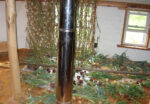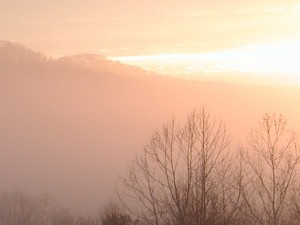We recently buried my sister. This was the third time I have participated in a home burial, on the person’s own land, with no funeral director officiating. And once again I heard people say, “You mean you can just do this yourself? I thought you had to hire a funeral home.”
Just once I experienced what we have come to call a conventional funeral—and the difference was stark. So I feel compelled to let people know that they do have a choice. In West Virginia you can pretty much do whatever you want.
In my opinion, when you and the rest of the community that surrounded the deceased in life come together to deal with the burial, to dig the grave and build a box (if desired), to speak from the heart to each other about your memories and attachment to the person passing on, this begins the process of the community coming together around the hole that has opened up in your midst. I notice that people are eager to grab a shovel and help, if only a token amount, with the covering of the grave—there is something satisfying about a hands-on ritual, closing that hole both literally and symbolically. And doing it this way, the way virtually all our ancestors dealt with death going back thousands of years, connects you with all those people, connects you with the cycles of birth and death in a way that is very comforting.
My other purpose with this essay is to urge you to discuss your choices with your loved ones in advance—your choices, and theirs. Do you want cremation, organ donation, embalming, burial—and if burial, where? This may also require researching the laws of other states if that’s where your loved ones live. This may be a difficult conversation, and some may shy away from having it. But avoiding it can come with a steep price, if someone dies suddenly and unexpectedly. Because then the survivor has to make decisions quickly, at a time when they feel like they’ve been run over by a truck, emotionally speaking, and can’t think straight. This is the juncture at which a vulnerable person often speaks to an undertaker who promises to “take care of everything…” Which they do, but next thing the bereaved knows, they’ve spent thousands of dollars. And, in my opinion, having a paid stranger officiating actually interferes with the healing process.
I don’t want to say no one should hire a funeral home, or do cremation—for some this may be the best choice. And I need to note here that in all three of the burials in which I was involved, a local funeral director was involved—once because Stump was the county coroner and twice because Taylor had to bring the body from a hospital to their coldroom. And in all three cases, Mr. Stump and John H. Taylor were nothing but gracious and accommodating, never pushy. But this may not be your experience, elsewhere, especially if you’re unprepared.
If you have had the conversations I’m suggesting, and your worst nightmare comes true—your beloved spouse or parent or child or friend has died—you may not know how you’ll get through the rest of your life without them but at least you’ll know what to do right away. You won’t have to think clearly or make decisions, you’ll just carry out the plans you made when you weren’t in emotional turmoil.
Incidentally, it’s also not a bad idea to write, sign and get witnessed a Living Will and Medical Power of Attorney. The Living Will spells out what you want done, or not, if you aren’t in a position to speak up (like you’re in a coma). The Medical Power of Attorney appoints a person to make the decisions in that circumstance. You can also include instructions related to death and burial and funeral in the Living Will. Leave copies with the local hospitals and with loved ones.
Many of us are reluctant to talk (or think) about death. But it is not optional. Every one of us will have to die someday, and most of us will have to cope with the death of a loved one at least once first. While we can’t opt out of it, though, we have more options than most people realize when it comes to how we deal with it. This is surely a time of great pain, but it’s also a time of great beauty. Death is a great dark gateway, an opportunity for transformation. It can be such an opportunity for the survivors as well as the one who walks through it, if you dare to touch it directly… if you demand the right to do it your own way.













So sorry for your loss. These are issues best considered as you said (BEFORE) rather than after. My Mom had to plan my dad’s conventional funeral while she was hooked up to an IV doing chemo for her cancer (he died from cancer as well).
Ohio has some natural places for final resting (Wilmot Wilderness Center) . I think the cost is about $6000.